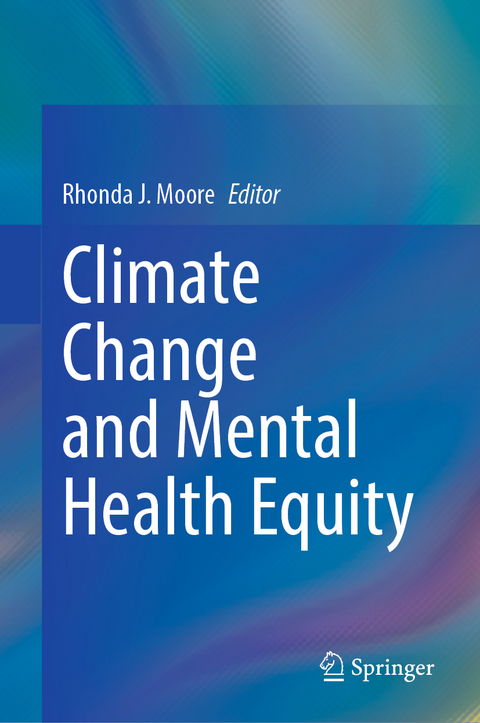
Climate Change and Mental Health Equity
Springer International Publishing (Verlag)
978-3-031-56735-3 (ISBN)
- Noch nicht erschienen - erscheint am 09.08.2024
- Versandkostenfrei innerhalb Deutschlands
- Auch auf Rechnung
- Verfügbarkeit in der Filiale vor Ort prüfen
- Artikel merken
Climate change is a driver of poverty, poor mental health, inequity, and increased intersectional vulnerability, with significant differential global impacts on individual and community health and well-being. For example, people living in low resource settings in high income countries (HICs) and in low and middle-income countries (LMICs) are at greater risk, often experiencing fragile socioeconomic, political and health infrastructures, and conflict-affected settings (FCAS) that place them at greater risk and vulnerabilities to climate change related mental health impacts.
The broad goal of this book is to place a social justice and inclusive lens on climate change and mental health equity focusing on these three key elements: people, place, and community. The book includes perspectives from the global North, the global South, and Indigenous perspectives to help provide greater insight into how we can better understand climate change and mental health equity across peoples, place, and community. This book's three-pronged approach will focus on certain trends in this emerging and growing field, also bridging some of the more extensive gaps, and is a tool for better understanding how mental health disparities might be addressed at this time.Rhonda Moore, PhD is an Autistic social scientist with over 15 years of combined experience as a medical anthropologist, behavioral scientist and health experience researcher who combines ethnographic methods, narrative and clinical medicine, marketing, health disparities, data science and ethics. She is writer/ editor of the following books: Climate Change and Mental Health Equity ( Springer Nature, 2024), the Handbook of Pain and Palliative Care (Springer Nature , 2012, 2nd edition, Springer Nature, 2019), Biobehavioral Approaches to Pain (Springer Nature 2009) and Cancer Culture and Communication (Springer Nature, 2004). Prior to her current role, she was a Program Officer in Global Mental Health at the US National Institutes on Mental Health (NIMH). Her program in Global Mental Health focused on social determinants of health, ethics of new and emerging technologies, citizen science, and climate change and mental health. She was also the program lead for the digital global mental health technology program in low- and middle-income countries (LMICs). She received her PhD in Cultural Anthropology from Stanford University, followed by post-doctoral fellowships and training in Behavioral Science (Stanford Medical School), Epidemiology (University of Texas MD Anderson Cancer Center) and Hospice/Palliative Care (St. Austell, Cornwall UK). Moore is also currently working to create inclusive organizational cultures that support intersectional neurodiverse lived experiences in the federal workplace and other cultural and institutional contexts.
Chapter 1 Broad Overview: Pathways, moderators and mediating factors connecting climate change to broader mental health impacts in global settings-what do we know and where are the gaps.- Chapter 2 Climate Change and neurodevelopmental impacts (e.g., pregnancy, neurodevelopmental impacts).- Chapter 3 Climate change and impact on youth.- Chapter 4 climate change and sex/gender impacts.- Chapter 5 Climate Change, Mental Health and Gender Based Violence.- Chapter 6 Climate Change, Ethics and Equity Climate change not only threatens our ecosystems, it undermines the foundation of our fundamental rights, deepens inequalities and creates new[rm2] forms of inequity.- Chapter 7 Climate Change, Mental Health in Disaster Settings -Differential Impacts on Mental Health.- Chapter 8 Climate Justice and Equity.- Chapter 9 Climate Change and Disability.- Chapter 10 Climate Change and the Future of Work.- Chapter 11 Climate Change, Mental Health and human security.- Chapter 12 Climate Change, food insecurity and human rights.- Chapter 13 Climate change, migration and mental health.- Chapter 14 Climate Change, AI and Mental Health Solutions-Human Centered AI.- Chapter 15 Climate Change and Complexity theory-thinking about equitable solutions.- Chapter 16 Digital mental Health and Climate Change Solutions.- Chapter 17 Economic Impact of Climate Change - including Economic impacts; Cost-benefit analyses.- Chapter 18 Using game design to promote Mental Health Resilience.- Chapter 19 Indigenous rights, Cultural Heritage and solutions.
| Erscheinungsdatum | 20.07.2024 |
|---|---|
| Zusatzinfo | XXIX, 529 p. 28 illus., 25 illus. in color. |
| Verlagsort | Cham |
| Sprache | englisch |
| Maße | 155 x 235 mm |
| Themenwelt | Geisteswissenschaften ► Psychologie ► Klinische Psychologie |
| Schlagworte | climate change • Clinical psychology • Mental Health • Mental Health Equity • Psychology • Public Health |
| ISBN-10 | 3-031-56735-8 / 3031567358 |
| ISBN-13 | 978-3-031-56735-3 / 9783031567353 |
| Zustand | Neuware |
| Haben Sie eine Frage zum Produkt? |
aus dem Bereich


